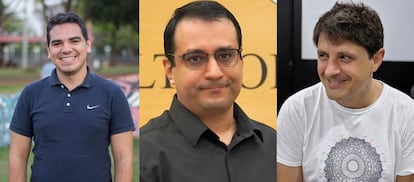Testing free will: New experiments on the quantum property that baffled Einstein
A paper questions assumptions about ‘nonlocality,’ the instantaneous influence between particles at a distance, rekindling old questions about freedom of choice

One of the reasons Albert Einstein disapproved of quantum physics is that it seems to predict instantaneous actions at a distance, influences that seem to propagate faster than the speed of light. In 2022, Alain Aspect, John Clauser and Anton Zeilinger were awarded the Nobel Prize in Physics for their experiments confirming quantum “nonlocality”: the existence of correlations that cannot be explained by “hidden-variable” theories, meaning those in which observers have free will (to choose which measurements to make) and in which communication at speeds faster than the speed of light is impossible.
However, the Nobel-winning experiments did not clarify the mechanism responsible for this nonlocality. One possibility is that hidden variables determine which measurements are made: the free will that physicists believe they have would thus be an illusion. Another possibility is that superluminal communication is possible. A third possibility is that hidden variables do not exist at all.
An article published in Nature Communications by Carlos Vieira, Ravishankar Ramanathan and Adán Cabello, from the universities of Campinas (Brazil), Hong Kong and Seville (Spain), respectively, states that it is possible to carry out new experiments that will allow us to decide between these possibilities.
“We show that, if only one [of the assumptions behind local hidden-variable theories] fails, then it has to fail completely, therefore excluding models that partially constrain freedom of choice or allow for partial retrocausal influences, or allow partial instantaneous actions at a distance,” the researchers argue in their paper. Nicolas Gisin of the University of Geneva in Switzerland told New Scientist that this research could help eliminate some of the misconceptions about why quantum theory is “nonlocal.”
“For 100 years everyone has been giving their opinion on it. But we’re supposed to be doing science here. Our work, quite deliberately, is completely aseptic. You have to look at what the experiments say. Someone might be repulsed by the lack of free will, but it’s a logical possibility. So, as such, we’re going to study it scientifically. Someone might be repulsed, like Einstein, by instantaneous actions at a distance, but it’s a logical possibility in this debate, so we’re going to try to explore it scientifically. It’s not a matter of opinion; we’re going to the lab to see what happens,” said Adán Cabello, one of the researchers.
This question of the lack of free will can also fuel belief in superdeterminism, a concept that the Argentine astrophysicist and philosopher Gustavo E. Romero summarizes thus: “In everyday language, it would mean that all events in the universe are predetermined by a common beginning. All states were defined by a past state. In other words, there is strict determinism in the universe.”
“In my opinion, there are philosophical reasons to think that free will doesn’t exist, and that it doesn’t make sense,” Romero argued in a recent interview: “If you look at the cosmological context, the entire universe was originally so compact that, basically, all systems were causally connected to one another. Human beings obey natural laws in the same way as everything else that exists, everything that is natural.”
Aside from the philosophical variables, the recent research by Vieira, Ramanathan and Cabello has practical applications. Cabello points out that, in cryptography, the level of security would be increased. “In current systems, it is assumed that the adversary cannot decide what measures are taken. However, the adversary could hack the random number generators used to choose the measures and compromise security. What we show is that security can be restored even in this case, and as long as the hack is only partial.”
There are also practical applications for quantum computing. In this regard, Ramanathan tells New Scientist that quantum computers can benefit from the discovery because the problem of some parts of the computer having unwanted influences on other parts can be mitigated.
Sign up for our weekly newsletter to get more English-language news coverage from EL PAÍS USA Edition
Tu suscripción se está usando en otro dispositivo
¿Quieres añadir otro usuario a tu suscripción?
Si continúas leyendo en este dispositivo, no se podrá leer en el otro.
FlechaTu suscripción se está usando en otro dispositivo y solo puedes acceder a EL PAÍS desde un dispositivo a la vez.
Si quieres compartir tu cuenta, cambia tu suscripción a la modalidad Premium, así podrás añadir otro usuario. Cada uno accederá con su propia cuenta de email, lo que os permitirá personalizar vuestra experiencia en EL PAÍS.
¿Tienes una suscripción de empresa? Accede aquí para contratar más cuentas.
En el caso de no saber quién está usando tu cuenta, te recomendamos cambiar tu contraseña aquí.
Si decides continuar compartiendo tu cuenta, este mensaje se mostrará en tu dispositivo y en el de la otra persona que está usando tu cuenta de forma indefinida, afectando a tu experiencia de lectura. Puedes consultar aquí los términos y condiciones de la suscripción digital.









































